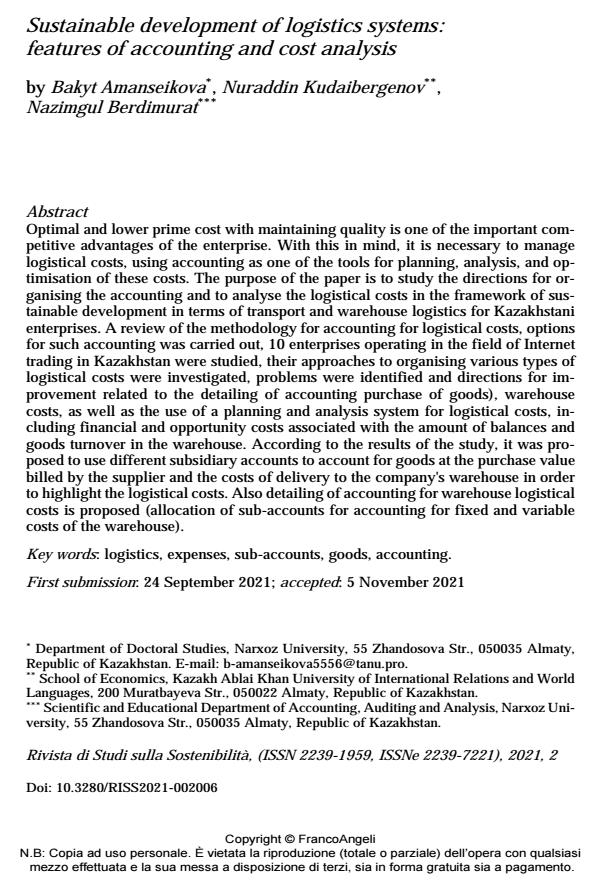Sustainable development of logistics systems: features of accounting and cost analysis
Journal title RIVISTA DI STUDI SULLA SOSTENIBILITA'
Author/s Bakyt Amanseikova, Nuradin Kudaibergenov, Nazimgul Berdimurat
Publishing Year 2022 Issue 2021/2
Language English Pages 16 P. 63-78 File size 235 KB
DOI 10.3280/RISS2021-002006
DOI is like a bar code for intellectual property: to have more infomation
click here
Below, you can see the article first page
If you want to buy this article in PDF format, you can do it, following the instructions to buy download credits

FrancoAngeli is member of Publishers International Linking Association, Inc (PILA), a not-for-profit association which run the CrossRef service enabling links to and from online scholarly content.
Optimal and lower prime cost with maintaining quality is one of the important competitive advantages of the enterprise. With this in mind, it is necessary to manage logistical costs, using accounting as one of the tools for planning, analysis, and optimisation of these costs. The purpose of the paper is to study the directions for organising the accounting and to analyse the logistical costs in the framework of sustainable development in terms of transport and warehouse logistics for Ka-zakhstani enterprises. A review of the methodology for accounting for logistical costs, options for such accounting was carried out, 10 enterprises operating in the field of Internet trading in Kazakhstan were studied, their approaches to organising various types of logistical costs were investigated, problems were identified and directions for improvement related to the detailing of accounting purchase of goods), warehouse costs, as well as the use of a planning and analysis system for logistical costs, including financial and opportunity costs associated with the amount of balances and goods turnover in the warehouse. According to the results of the study, it was proposed to use different subsidiary accounts to account for goods at the purchase value billed by the supplier and the costs of delivery to the company's warehouse in order to highlight the logistical costs. Also detailing of ac-counting for warehouse logistical costs is proposed (allocation of sub-accounts for accounting for fixed and variable costs of the warehouse).
Keywords: logistics, expenses, sub-accounts, goods, accounting.
Bakyt Amanseikova, Nuradin Kudaibergenov, Nazimgul Berdimurat, Sustainable development of logistics systems: features of accounting and cost analysis in "RIVISTA DI STUDI SULLA SOSTENIBILITA'" 2/2021, pp 63-78, DOI: 10.3280/RISS2021-002006